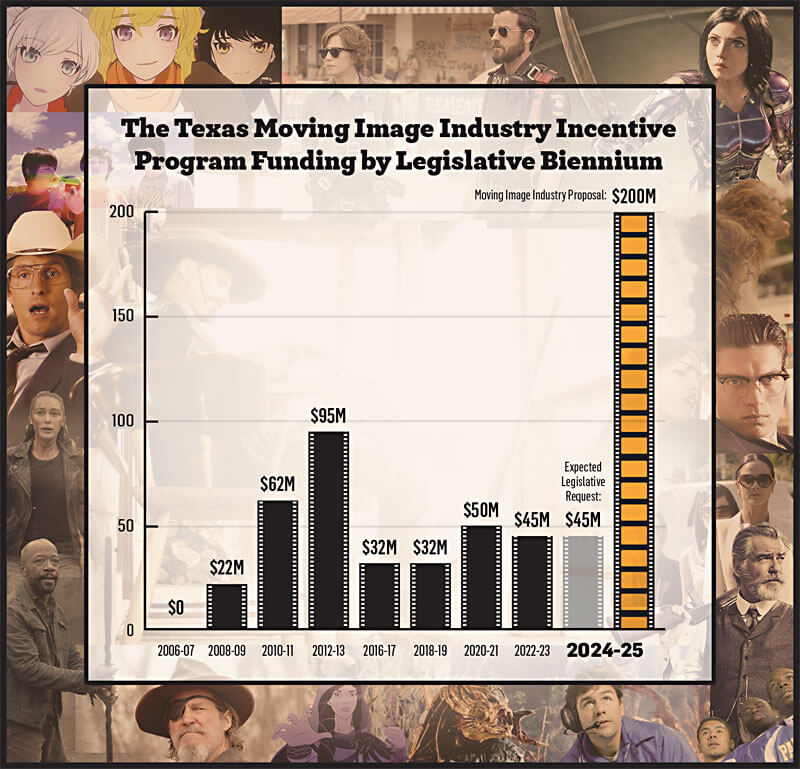original content
“It’s amazing, it’s historic, it’s the best result we could have ever hoped for.” That’s how Austin Film Commission Executive Director Brian Gannon described the new funding totals for the Texas Moving Image Industry Incentive Program. But how much is it … and what’s the catch?
During the recent regular session of the Texas legislature, groups like the Texas Media Production Alliance were lobbying for lawmakers to allocate $200 million to the state’s tax rebate program for film, television, and gaming production. That would be a 344% increase over the $45 million allocation for the 2022-23 biennium, and more than double the highest previous appropriation ($90 million in 2012-13). However, they argued such a massive raise would finally put the program at the kind of funding levels it needs.
So, shocking everyone, the legislature has approved that $200 million total.
Kinda.
The headline number is the good, big news: As TXMPA Communications Director Mindy Raymond explained, “We asked for $200 million at the beginning of session and we ended up with $200 million at the end of session.”
The bad news is that the total in the regular budget contained in House Bill 1 remains at $45 million. However, lawmakers have written an extra $155 million into Senate Bill 30, the supplemental appropriations bills intended to cover unpaid bills from the last biennium. Now, Gannon said, “It’s just waiting for the governor’s signature.”
The program, which was established in 2005, has always run short of money – quite literally. Last biennium, Texas lost several productions, including Fear the Walking Dead, because the kitty was empty well before the end of the two-year financial cycle.
However, the way the increase is divided up has created some degree of concern: It could be all too easy for lawmakers to come back in 2025 and argue that the $155 million was a one-off, and that the allocation was really that $45 million.
Still, no one is turning their nose up at the boost, even if it does turn out to be a one-off. Behind closed doors, a lot of credit is going to Yellowstone creator Taylor Sheridan, who lobbied heavily with top ranking Republicans like Lt. Gov. Dan Patrick, and whose projects are expected to be major recipients of the increased fund (there’s a running joke that TMIIIP should be renamed TSIP – the Taylor Sheridan Incentive Program).
However, there are some concerns about another bill that had Sheridan’s backing: HB 4539 by Rep. Craig Goldman, R-Fort Worth, which drops a major eligibility criterion for a TMIIIP application. Currently, applying projects need to hire a minimum of 70% Texas resident cast and crew. This bill, which passed the legislature and now heads to Gov. Greg Abbott for his signature, faced pushback from the Texas industry because it would make it easier for producers to bring in out-of-state talent, rather than drawing on the state’s plentiful crew base.
That percentage has been contentious, with an early push to drop it to 25%. However, that was a low that the state industry was not going to accept: As Raymond explained, “The whole point of this program is to put Texans to work,” and at least at 55% it ensure a majority of the crew will be local.
By contrast, there was a sigh of relief at the failure of HB 3600 by Rep. Four Price, R-Amarillo, which would have created the Texas Multimedia Production Program. Based on Georgia’s Film Tax Incentive, the program faced pushback from industry groups who feared it would complicate the picture for the established and trusted TMIIIP, while fiscal conservatives blanched at its estimated $1.4 billion price tag. (Moreover, the Georgia program is currently being audited over concerns that 87% of the rebate is going to out-of-state vendors, rather than building up in-state businesses.)
There are much more mixed feelings about the failure of another Goldman bill, HB 4419. That was an omnibus film industry bill that, as is often the way with such “Christmas tree” bills (the term for when a measure gets loaded with a multitude of loosely-related but still germane amendments), pleased and disappointed in equal measures. There’s disappointment over the loss of the initiative to establish virtual film production facilities at Texas A&M University at College Station and Texas State University (although there is still funding in the regular budget to construct the College Station facility). However, the changes to the Major Events Trust Fund that were supposed to open it up to bigger film projects seemed like a fiscal non-starter, and so the failure of that change is being greeted with few tears.
However, Raymond argued that the number of bills introduced from both sides of the aisle, all with the intention of improving production in Texas, is a major step forward. She said, “All of these people came together in support of our industry”









